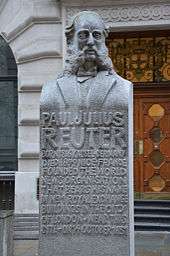Paul Reuter

Paul Julius Freiherr von Reuter (Baron de Reuter) (21 July 1816 – 25 February 1899), a German entrepreneur, pioneer of telegraphy and news reporting[1] was a reporter and media owner, and the founder of Reuters News Agency,[2] since 2008 part of the Thomson Reuters conglomerate.
Biography
Born Israel Josaphat in Kassel, Germany, his father, Samuel Levi Josaphat, was a rabbi. His mother was Betty Sanders. In Göttingen, Reuter met Carl Friedrich Gauss, who was experimenting with the transmission of electrical signals via wire.
On 29 October 1845, he moved to London, calling himself Julius Josaphat. On 16 November 1845, he converted to Christianity, in a ceremony at St. George's German Lutheran Chapel in London[3] and changed his name to Paul Julius Reuter. One week later, in the same chapel, he married Ida Maria Elizabeth Clementine Magnus of Berlin, daughter of a Lutheran pastor.
A former bank clerk, in 1847 he became a partner in Reuter and Stargardt, a Berlin book-publishing firm. The distribution of radical pamphlets by the firm at the beginning of the 1848 Revolution may have focussed official scrutiny on Reuter. Later that year he left for Paris[4] and worked in Charles-Louis Havas' news agency, the future Agence France Presse. As telegraphy evolved, Reuter founded his own news agency in Aachen transferring messages between Brussels and Aachen using carrier pigeons, thus linking Berlin and Paris. Speedier than the post train, pigeons gave Reuter faster access to financial news from the Paris stock exchange. Eventually pigeons were replaced by a direct telegraph link.[5] A telegraph line was under construction between Britain and Europe and so Reuter moved to London, renting an office near the Stock Exchange. In 1863 he privately erected a telegraph link to Crookhaven, the farthest south-west point of Ireland. On nearing Crookhaven, ships from America threw canisters containing news into the sea. These were retrieved by Reuters and telegraphed directly to London, arriving long before the ships reached Cork.

In 1872, Nasir al-Din Shah, the Shah of Iran, signed an agreement with Reuter, a concession selling him all railroads, canals, most of the mines, all the government's forests, and all future industries of Iran. George Nathaniel Curzon called it "The most complete and extraordinary surrender of the entire industrial resources of a kingdom into foreign hands that has ever been dreamed of".[6] The Reuter concession was immediately denounced by all ranks of businessmen, clergy, and nationalists of Persia, and was quickly forced into cancellation.
On 17 March 1857, Reuter was naturalised as a British subject. On 7 September 1871, the Duke of Saxe-Coburg-Gotha conferred a barony (Freiherr) on Julius Reuter. The title was later "confirmed by Queen Victoria as conferring the privileges of the nobility in England".[7]
Reuter had three sons; Herbert, 2nd Baron de Reuter (succeeded by his son Hubert as 3rd Baron), George Reuter and Alfred Reuter.[8] Clementine Maria, one of his daughters, married Count Otto Stenbock, and after Stenbock's death, Sir Herbert Chermside, a governor of Queensland.[9] George had two sons, Oliver, 4th Baron de Reuter, and Ronald Reuter. The last member of the family, Marguerite, Baroness de Reuter, widow of the 4th Baron and Paul Julius Reuter's granddaughter-in-law, died on 25 January 2009, at the age of 96.[7][10]
Paul Julius Reuter died in 1899 at Villa Reuter, Nice, France. He was buried in West Norwood Cemetery in south London.
Reuter was portrayed by Edward G. Robinson in the Warner Bros. biopic A Dispatch from Reuter's (1941).
The Reuters News Agency commemorated the 100th anniversary of the death of its founder by launching a university award (Paul Julius Reuter Innovation Award) in Germany.[3]
See also
References
- ↑ Paul Julius Reuter: a Dictionary of World History 2000
- ↑ Company History (1889-1799) - Thomson Reuters
- 1 2 Encyclopedia of World Biography 2004
- ↑ http://www.britannica.com/
- ↑ Standage, T. The Victorian Internet (1999)
- ↑ Persia and the Persian question, Vol.I London. Frank Cass and Co. Ltd. 1966. p.480
- 1 2 Baroness Reuter, last link to news dynasty, dies
- ↑ Jones, Sir Roderick (1951). A life in Reuters. Hodder & Stoughton. The 2nd Baron (born 1852, died 1915) committed suicide 3 days after the death of his wife. He was succeeded by his son, Hubert.
- ↑ ADB - Sir Herbert Chermside
- ↑ "Baroness de Reuter, last link to news dynasty, dies". ABC News (Australia). Reuters. 26 January 2009. Retrieved 21 February 2009.
External links
| Wikimedia Commons has media related to Paul Reuter. |
-
 "Reuter, Paul Julius, Baron de". Encyclopædia Britannica (11th ed.). 1911.
"Reuter, Paul Julius, Baron de". Encyclopædia Britannica (11th ed.). 1911. -
 "Reuter, Paul Julius, Baron". Encyclopedia Americana. 1920.
"Reuter, Paul Julius, Baron". Encyclopedia Americana. 1920. -
 "Reuter, Paul Julius, Baron". New International Encyclopedia. 1905.
"Reuter, Paul Julius, Baron". New International Encyclopedia. 1905. - 3D photo scan of the Paul Reuters statue in London on sketchfab.com
|